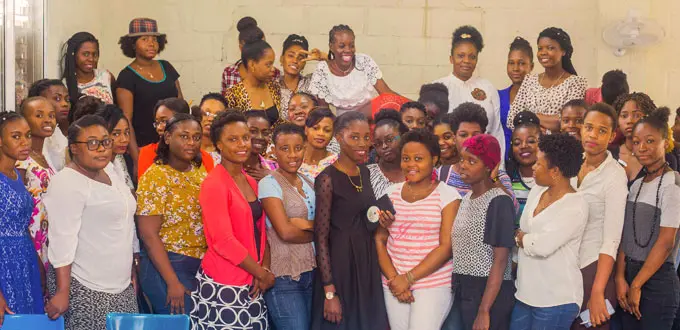Key Takeaways: The Lessons LACNIC Learned from AYITIC GOES GLOBAL
28/11/2019

Carolina Caeiro
LACNIC is committed to promoting the transformative role of the Internet as a tool for promoting social inclusion and economic development in our region.
And this is precisely the goal of Ayitic Goes Global: to strengthen the role of the Internet as a catalyst for change in the context of Haiti.
The project focused on two key objectives: promoting the development of the Internet in Haiti and integrating a new generation of Haitian women into the world of technology and the digital economy.
LACNIC concludes this initiative with three key takeaways: the importance of accompanying local communities to promote Internet adoption, the transformative power of technology for empowering women in the region, and the potential of online training for Latin America and the Caribbean.
Consolidating Internet Development in Haiti
In 2018, Internet penetration in Haiti was approximately 15%, a figure that is significantly lower than the regional average of over 60%. In addition, the human and economic consequences of the earthquake that hit Haiti in 2010 deeply affected the local technical community.
So, how can an organization such as LACNIC contribute to Internet development in Haiti or in other countries of the region that may be faced with similar challenges? LACNIC decided to provide training and promote the articulation with professionals that are part of the local technical community.
Ayitic Goes Global worked with Max Larson Henry – an experienced leader of the technical community – and École Supérieure d’Infotronique d’Haïti to offer online training courses on network management and security to approximately 150 professionals. The courses were added to the LACNIC Campus training offerings, which benefitted more than 3,000 students from around the region.
At the same time, in order to promote the articulation with technical professionals in Haiti, the program organized a series of complementary training activities on IPv6 deployment, security and traffic exchange points. As a result, the local Internet exchange point was strengthened thanks to the deployment of new management techniques; two Internet service providers received technical assistance for the implementation of the IPv6 protocol at network level and, perhaps most importantly, the technical staff of multiple local companies are now better prepared.
The main takeaway from the work carried out by LACNIC in Haiti is the importance of accompanying local communities in strengthening their technical capabilities and the consolidation of collaborative environments. This project contributed to an increase in the level of preparation and articulation of the local ecosystem for its continuous and gradual deployment in the future.
More Haitian Women in Technology
Internet access and digital skills allow us, for example, to strengthen our own enterprises, to work remotely or to improve our chances to access the job market. In a context where women are affected by unequally high levels of unemployment, Ayitic Goes Global sought to rely on the inclusive power of technology to empower women in Haiti.
Ayitic Goes Global and its focus on women allowed documenting the major impact of digital inclusion on the transformation of gender roles. The women who participated in the program stressed how the project had managed to empower them before their families and the social circles where their new skills and the job opportunities they had accessed had allowed them to prove their abilities and willpower.
Likewise, Ayitic Goes Global allowed LACNIC to confirm that actions focusing exclusively on women have a high impact on promoting equality and transforming gender dynamics in the technology ecosystem. The organization will attempt to replicate this effect in the development of future gender initiatives.
Online Training as s High-Impact Strategy in LAC
The development of technical skills is a central pillar of LACNIC’s work. To achieve scale, the organization has been focusing heavily on virtual training through its online campus.
Ayitic Goes Global showed that online training remains a viable option even in contexts such as Haiti with low levels of connectivity, limited access to digital devices, and difficulties in gaining access to electricity. The courses for women concluded with high levels of achievement: the dropout rate was only 3%, while the graduation rate was 85%. In the case of training for IT experts, the graduation rate was approximately 60%.
For LACNIC, this lesson learned from Ayitic Goes Global confirms the value of e-learning as a tool for training at a larger scale, even in countries where people are facing challenges similar to those observed in Haiti.
Future Steps
Working in association with multiple local and regional organizations was key to the success of the project and proved to be essential for the continuity of the initiative.
The efforts initiated by Ayitic Goes Global will continue in the hands of the program’s partners. The Caribbean Open Institute, an entity responsible for organizing courses seeking to strengthen the population’s digital skills to increase access to employment, has signed an agreement with Google to expand the training activities to more than five countries in Central America and the Caribbean, among them Haiti. In addition, École Supérieure d’Infotronique d’Haïti is in the process of supporting the women who graduated from the program to continue their job searches through online platforms. In addition, LACNIC plans to continue to support the local technical community and bring Haitian professionals closer to the immediate LACNIC community.
(Free access, no subscription required)